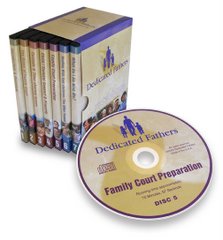Preparing Your Divorce Case
www.dedicatedfathers.org
Step 1: KEEPING A JOURNAL
Immediately upon knowing you will be going into family court (or when you think you are heading into family court), one of the first and most important things you need to start doing is keeping journal of all significant events concerning you, your children, your finances and the other parent.
More often than not, each time you go to your divorce or child custody hearings you will need to provide a statement as to specifically what you want and justification for why you should get it. This written statement is called your “declaration.” The information in your declaration is taken directly from your written journal as outlined above.
In family court, some judges will not listen to what you have to say verbally. They will rely totally on what you have written in your papers and what the other parent has written in their responsive papers. Therefore, writing your declaration may be a very critical part of whether or not you get what you are asking for, which makes your journal entries extremely important to your case.
Step 2: PREPARING TO WRITE YOUR DECLARATION
Stay away from bringing up negative issues about the other parent, it usually makes you and not the other parent, look bad in the eyes of the court. However, many times in response to issues raised by the other parent, you will need to respond by bring up negative issues. Likewise, many times the only way to show a substantial change of circumstances affecting the best interest of your child is to bring up negative issues about the other parent. However, be very careful in the way you bring up those negative issues.
Only bring up negative issues IF you can show, demonstrate or prove how it directly affects your child or your relationship with your child - otherwise, leave it alone.
The cardinal rule of bringing up negative issues is that you always, always, always, label the negative issues as “CONCERNS.” Example: “I am concerned that every time I go to pick up our child, the other parent is never at home. I believe this confuses our child and allows our child to believe I have not come to see them and do not care about them, which is simply not true and not in our child’s best interests.”
Step 3: WRITING YOUR DECLARATION
Your declaration is simply your very clearly written statement of what has happened, including all dates whenever possible, which clearly provide the court with the reasons and justifications for the order you want the court to make. Every request you make needs to have a reason or justification for it. The judge knows absolutely nothing about you or your case. You need to bring the judge up to speed about your case very quickly (they don’t have much time to review each case, maybe 5 to 10 minutes at most).
Whenever possible, attach proof or evidence which supports what you are writing. If you do not have the proof or evidence, then state where such evidence is located. Some ideas as to proof or evidence may be pictures of you and your children enjoying your time together, statements from witnesses who have seen you interact with your children, time cards showing when you actually work, letters from teachers or church leaders as to your involvement with school and church. Get creative, but be able to back up your claims.
Step 4: THE COURT FILE
You will want to ensure you have an exact copy of the court divorce file, which you can get from the County Clerk at your family courthouse. Your court divorce file is needed so whomever is assisting you can see what has happened so far in your case.
Also, there are many times wherein something which has happened before will prevent you from bringing up the same issues again - a review of your court file will let you know this information. Additionally, there are many times wherein new or different paperwork is required based on what has happened before - again, a review of your court file will let you know this information.
Therefore, you will want to keep and maintain an up-to-date court file at all times.
Step 5: CHILD SUPPORT AND SPOUSAL SUPPORT (ALIMONY)
It is in your best interests to start getting copies of all canceled checks made for any kind of support you have paid and ensure you make copies of both the front and the back of those checks. Additionally, ensure you put on the check itself on the bottom left hand “comments” section that the check is for “child support” or “spousal support.”
IF YOU CAN’T PROVE YOU HAVE PAID IT, YOU OWE IT !
Never, ever pay any type of support in cash. Why? Because there is no way to prove the other parent received the money if you do not have a copy of the other parent’s signature and deposit notations from your canceled check.
Step 6: MAINTAIN ORGANIZED FILES OF EVERYTHING
You will eventually have numerous files about your divorce or child custody case which you will want to maintain and keep organized at all times. Some of the files you will want to keep are as follows:
A) One file for all correspondence with the other parent kept in chronological
order;
B) One file for all correspondence with your attorney and/or paralegal kept in
chronological order;
C) One file for all correspondence with the other parent’s family law attorney kept in chronological order;
D) One file for all correspondence with the state agency collecting support
payments kept in chronological order; and
E) One file of all proof of all payments made for support (including both the front and the back of canceled checks).
Step 7: CONSULTATION WITH AN ATTORNEY AND/OR PARALEGAL
Armed with all of the information as outlined in Step 1 through Step 6 above, you are now ready to consult with a family law attorney, paralegal and or support organization about your divorce or child custody case.
One last thing:
"Not everything that is faced can be changed, but nothing can be changed until
it is faced." ---James Baldwin
By: Marvin Chapman
Order the Dedicated Fathers Audio Series Today!




















